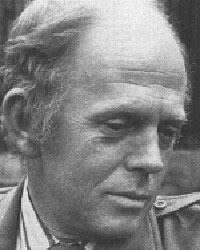Born in Sydney, Williamson studied piano, violin and french horn at Sydney Conservatorium and later composition with Sir Eugene Goossens before travelling to London in 1950 to continue his studies with Elizabeth Lutyens and Erwin Stein. He settled permanently in London in 1952 and was a noted pianist and organist by his early twenties. His first works were published with the help of Benjamin Britten and Sir Adrian Boult. Williamson’s musical inspiration springs both from a deep knowledge of the fields of man’s intellectual endeavour and from his own deep-rooted religious and humanitarian convictions. The variety and breadth of his music is enormous and there is virtually no musical genre in which he has not been active. His reputation was established in the 1960s, a decade in which he wrote prolifically: three operas for Sadler’s Wells Opera (Our Man in Havana, The Violins of St. Jacques and Lucky Peter’s Journey), Sinfonietta for the Royal Ballet, commissions for the BBC Proms and for Aldeburgh, Bath and Cheltenham Festivals, and the Symphony No. 2 for Constantin Silvestri and the Bournemouth Symphony Orchestra. In 1975, Williamson was named as the new Master of the Queen’s Music in succession to Arthur Bliss and in 1976, he was awarded the CBE. 1981, his 60th birthday year, was marked by a great many performances, the highlight of which was the simultaneous Radio 3 and BBC 2 broadcast of the monumental Mass of Christ the King. The years since have seen regular performances of his music at the BBC Proms and several large-scale orchestral commissions. |
|
|
|
|
Malcolm Williamson - Composer Information
Search our Library
Featured Composers
Counterpoint Music Library Services
Copyright © 2012 All Rights Reserved
Copyright © 2012 All Rights Reserved
Created by Wavelength Media

